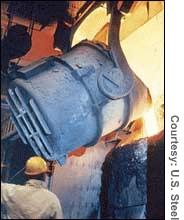|
Bush backs steel limits
|
 |
June 5, 2001: 5:08 p.m. ET
President asks for steel imports probe sought by steelmakers, union
|
NEW YORK (CNNfn) - Taking a protectionist step rejected by the Clinton Administration, President Bush asked the U.S. International Trade Commission on Tuesday to investigate whether restrictions on steel imports are needed.
"I am deeply concerned ... about the situation of the U.S. steel industry," Bush told reporters at the White House.
"We're concerned about unfair trade practices that may be affecting the economics of the steel industry and therefore (I) call upon the International Trade Commission under Section 201 to have a full investigation of the industry, of the imports coming into the United States, to make sure that our industry is not being affected by unfair trade practices," he added.

|
|
|
President Bush announced Tuesday he would move to limit steel imports. | |
U.S. steel producers and steelworkers blame low-priced, unfairly traded steel imports for a string of bankruptcies in the U.S. steel industry since 1998. They tried unsuccessfully to persuade former President Clinton to launch a "section 201" investigation before he left office.
A section 201 probe would allow Bush to restrict steel imports for an initial period of up to four years to give the steel industry time to restructure. It could also give U.S. trade negotiators leverage to persuade other countries to reduce excess global steel capacity.
Bush's move won praise from both steelmakers and the United Steelworker Union of America, which had endorsed Vice President Al Gore in last year's election against Bush.
"We urge the administration to file its Section 201 action immediately, to make it comprehensive, and to seek emergency interim relief," said a statement from Leo Gerard, president of the union.
Critics say sanctions will cost, not save jobs
But critics of protections for the industry said that more jobs could be lost than gained if quotas are imposed.
The Consuming Industries Trade Action Coalition (CITAC), a trade group of steel importers and domestic customers of foreign steel, released a study in April that estimates that sanctions that could result from the Section 201 investigation could cost consumers as much as $2.34 billion a year, or as high as $565,000 per steel job protected.
Under a 201 quota scenario, the trade group said, roughly two-to-three times as many workers in steel-consuming industries would lose their jobs as would be protected in steel producing companies.
"There are 50 workers in steel-consuming companies for every one steelworker," said a statement from Jon Jenson, CITAC chairman. "The U.S. government measures how trade restraints on steel protect the domestic steel industry but not what consequences it has on steel users."
But the moved was praised by executives of leading steelmakers.
"Initiating a 201 investigation into the crisis in steel trade is a bold and responsive move by the administration," said Thomas Usher, chairman of USX Corp. and the acting president of the company's U.S. Steel unit. "It sends a message to our trading partners that the United States will no longer be a dumping ground for the world's excess steel – that it's time for them to solve their overcapacity problems and end their market-distorting practices."
Click here for a look at metals stocks
One of the leading House Democrats on steel issues was limited in his praise of the president's move.
"This is one of those things where the devil is in the details and we haven't seen the details yet," said Rep. Pete Visclosky, D-Ind., whose district encompasses Gary, Ind., and produces more steel than is made in any other state.
Visclosky, who is the ranking Democrat on the House Steel Caucus, said that it is important that the case be broad-reaching and not just limited to a few high-end products.
"While I am pleased by the news that the Bush administration will soon petition the ITC, I am greatly concerned about the products that will be covered by this investigation," he said. "I fully believe the investigation must be comprehensive in nature, across all product lines, including coke, iron ore and semi-finished slabs. If all these products are not included in section 201, there is a real possibility the United States could lose its capacity to produce steel domestic." 
-- from staff and wire reports
|
|
|
|
|
 |

|

